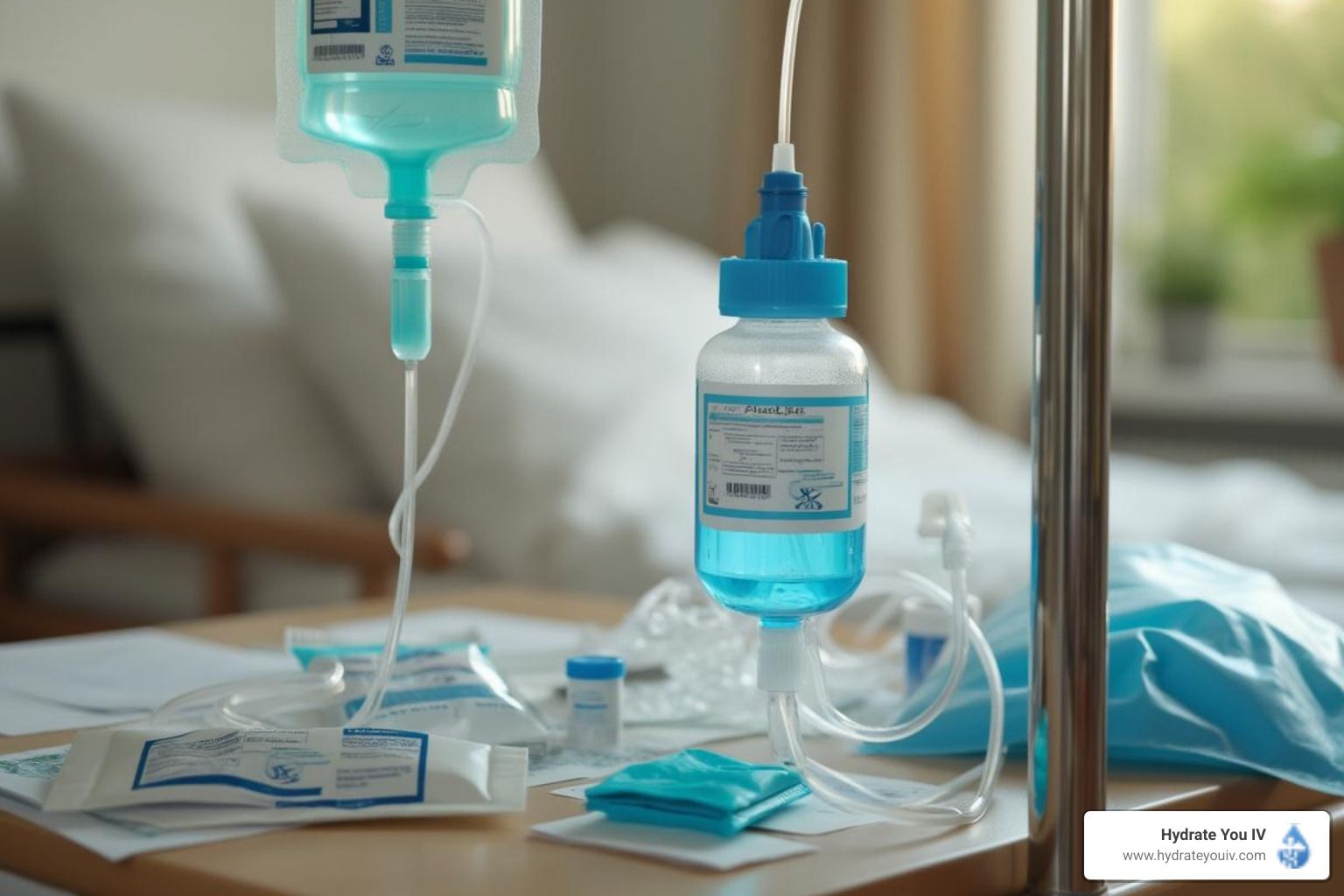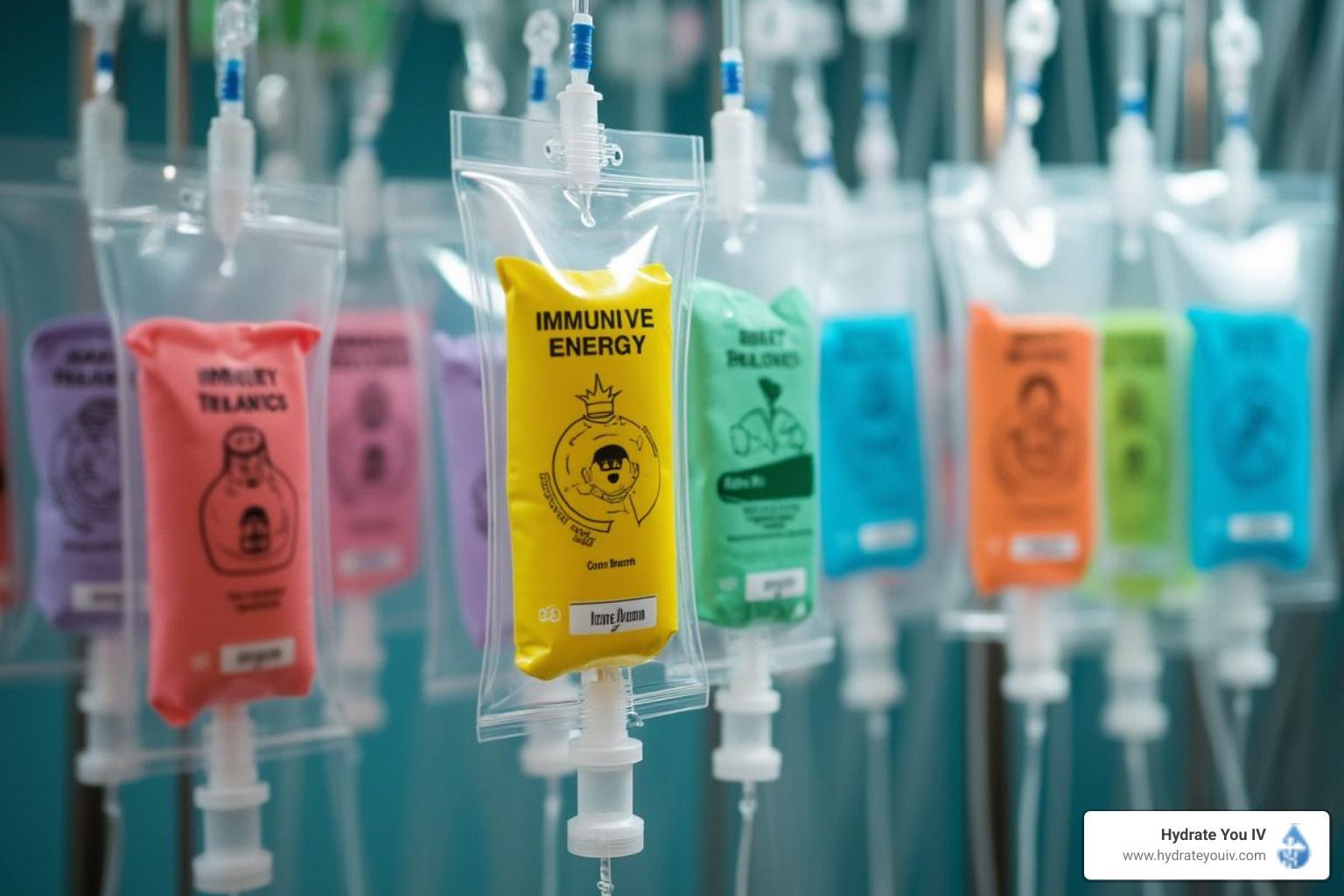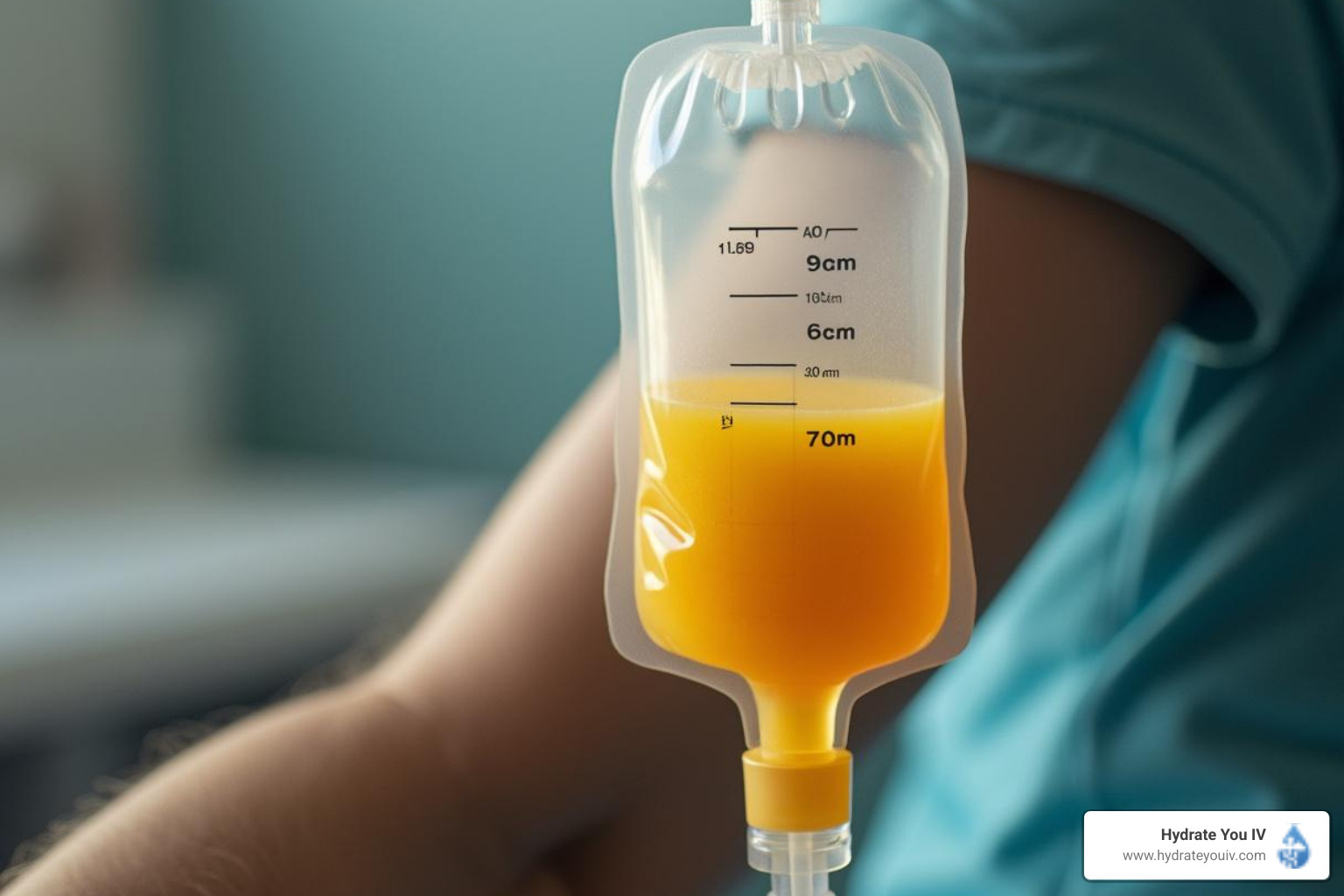IV Fluid for UTI: How It Helps and When It’s Needed
UTIs are common and painful. Antibiotics treat the infection, but hydration is crucial for recovery, it dilutes urine, helps flush bacteria, and eases irritation. IV therapy can support care by delivering rapid fluids and electrolytes to help the body manage symptoms more effectively.
At Hydrate You IV Therapy, we provide clinician-guided IV hydration as a supportive add-on, not a replacement for antibiotics, to help you feel steadier while you heal.
What Is a UTI & Why Hydration Matters
A urinary tract infection (UTI) occurs when bacteria—most often E. coli—enter the urinary system and multiply, leading to irritation and inflammation. Common symptoms include burning during urination, frequent urges to go, pelvic or abdominal pressure, and cloudy or strong-smelling urine. Left untreated, UTIs can spread to the kidneys and cause more serious complications.
Hydration plays a crucial role in both easing and preventing UTIs. When the body is dehydrated, urine becomes concentrated, which not only irritates the bladder lining but also makes it harder to flush out bacteria effectively. This prolongs discomfort and can worsen symptoms. By contrast, proper fluid balance keeps urine diluted, reduces irritation, and helps wash harmful bacteria from the urinary tract. Electrolytes like sodium and potassium further support muscle and nerve function in the bladder, aiding the body’s natural defense system.
How IV Fluid for UTI Helps Recovery
When a urinary tract infection leaves you burning, cramping, and rushing to the bathroom, drinking water matters—but it isn’t always enough. IV fluid for UTI recovery supports your treatment plan by restoring hydration quickly, diluting irritating urine, and helping your body flush bacteria more effectively while you heal.
- Why IV Hydration (vs. Only Drinking Water)
Because fluids enter the bloodstream directly, IV therapy provides rapid rehydration, especially useful if nausea, fever, or fatigue makes it difficult to drink enough. A steady infusion also keeps urine diluted, reducing irritation to the bladder lining and easing discomfort during recovery.
- Electrolytes That Support the Urinary Tract
Balanced IV solutions such as isotonic saline restore sodium and chloride to maintain proper fluid balance. When appropriate, potassium and other electrolytes may be added to support normal muscle and nerve function in the bladder and urinary tract. This matters because a good electrolyte balance helps the bladder contract effectively and supports kidney filtration—both essential for flushing infection.
- Nutrient Add-Ons (As Clinically Appropriate)
Some IV protocols include immune-supportive nutrients like vitamin C or zinc, along with antioxidants such as glutathione to reduce oxidative stress during illness. These add-ons are always tailored to your individual needs and are designed to complement not replace, prescribed antibiotics or medical treatment.
What IV Therapy Doesn’t Do (Important Limitations)
IV hydration can make UTI recovery more comfortable, but it has clear limits that need to be understood.
It does not replace antibiotics.
UTIs are
bacterial infections. While IV fluids rehydrate and dilute urine, they don’t eliminate bacteria. Clearing the infection typically requires the right antibiotic, prescribed based on symptoms, exam, and, when available, urine culture results. Relying on fluids alone can allow the infection to linger or worsen.
It does not kill bacteria or fix structural problems.
IV fluid for UTI support cannot act as an antimicrobial and cannot correct issues like kidney stones, urinary obstruction, or anatomical abnormalities that predispose to recurrent infections. Fluids help flush and reduce irritation; they don’t treat these underlying causes.
It is not a standalone cure.
IV therapy should be part of a holistic plan: take prescribed antibiotics as directed, hydrate, rest, practice good bladder habits, and attend follow-up. If symptoms escalate, urgent medical evaluation is necessary, as stronger or inpatient treatments may be required.
Bottom line: IV hydration can ease symptoms and support recovery, but it cannot substitute antibiotics, kill bacteria, or correct structural urinary problems. Its value is as a complementary tool within a medically supervised treatment plan.
Who Could Benefit from IV Fluid for UTI
Severe or complicated UTIs with dehydration risk
When a urinary tract infection causes high fever, vomiting, or intense pain, dehydration can quickly set in.
IV fluid for UTI care ensures fast rehydration, helping maintain urine output and supporting kidney function while antibiotics work to clear the infection.
Patients who cannot drink enough fluids
Some individuals struggle to stay hydrated due to
nausea, persistent vomiting, or other medical conditions. In these cases, IV therapy bypasses the digestive system and delivers hydration directly into the bloodstream, keeping fluids balanced and urine diluted even when oral intake is not possible.
Pregnant women with kidney involvement
Pregnancy increases the risk of UTIs progressing to kidney infections, which can be serious for both mother and baby. In such cases, IV fluids alongside antibiotics help stabilize hydration levels, support circulation, and protect maternal and fetal health.
Older adults and those with chronic conditions
The elderly, people with diabetes, or patients with weakened immune systems are more prone to complications and dehydration during a UTI. IV fluid for UTI recovery provides a safe way to restore hydration, reduce strain on the kidneys, and support overall recovery in vulnerable groups.
Individuals with recurrent UTIs during flare-ups
For those who
frequently suffer UTIs, especially when symptoms escalate quickly, IV hydration offers immediate relief by diluting urine and easing burning sensations while complementing prescribed medications.
Catheter-associated infections or structural issues
Patients with catheters, kidney stones, or urinary blockages may experience more severe infections. While fluids cannot fix structural problems, IV hydration supports urine flow and eases discomfort as part of a broader treatment plan.
Athletes and travelers in remote areas
Those who are
physically active, athlete, traveling, or located far from immediate medical care may benefit from
mobile IV fluid therapy. When oral hydration isn’t enough and access to clinics is delayed, IV hydration provides quick support until full treatment is available.
How HydrateYouIV Supports UTI Recovery with IV Fluid Therapy

At HydrateYouIV, we understand how draining urinary tract infections can be, especially when symptoms like fever, nausea, or fatigue make it hard to stay hydrated. That’s why our licensed clinicians provide personalized IV fluid therapy for UTI recovery in the comfort of your home, office, or hotel.
Our IV drips are tailored to help you feel better faster by:
- Restoring hydration quickly with balanced solutions like normal saline or lactated Ringer’s.
- Supporting urinary tract health with electrolytes that aid bladder function and kidney filtration.
- Reducing discomfort by keeping urine diluted and less irritating.
- Offering optional add-ons such as vitamin C, zinc, and glutathione for extra immune and antioxidant support.
Every infusion is guided by medical professionals who ensure safe setup, vein selection, and monitoring throughout your treatment. And because we’re mobile, you don’t need to travel to a clinic—we bring IV therapy directly to you, making it easier to recover comfortably while following your prescribed medical care plan. For families, teams, or friends booking together, we also provide a convenient group discount, making hydration therapy more accessible and affordable when multiple people need support.
HydrateYouIV’s role isn’t to replace antibiotics or medical treatment, but to complement your care plan by improving hydration, easing discomfort, and helping your body flush bacteria more effectively. It’s one more way we support you on your path to faster, safer recovery.











